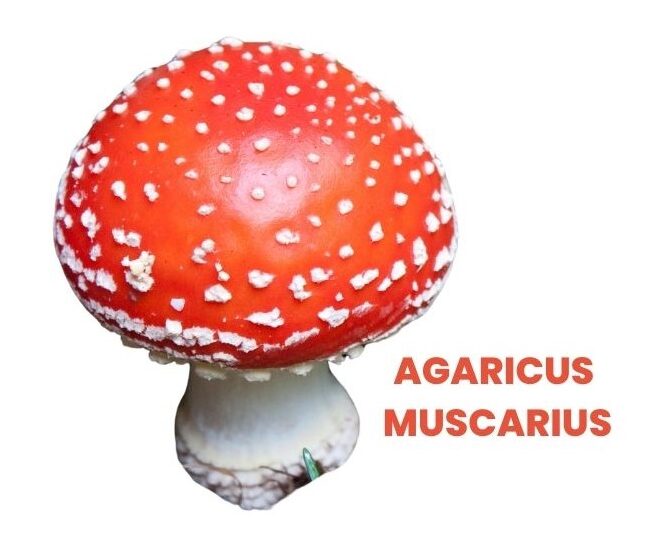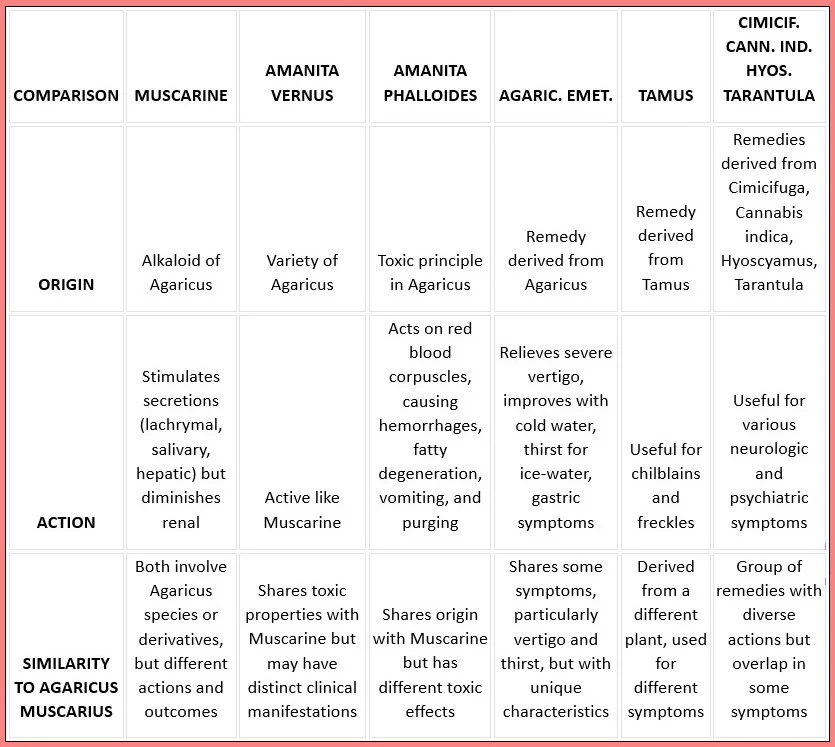Agaricus muscarius is a valuable remedy sourced from the vegetable kingdom.
It is particularly well-suited for addressing nervous affections, especially in the elderly and individuals with a history of alcoholism.
This remedy is known for its efficacy in managing conditions where patients may experience delirium and epileptiform fits.
PROVERS: Schbeter and Stapf

Table of Contents
ToggleSOURCE INFORMATION
COMMON NAME: Toadstool
- Kingdom: Fungi
- Division (Phylum): Basidiomycota
- Class: Agaricomycetes
- Order: Agaricales
- Family: Amanitaceae
- Genus: Agaricus
- Species: Agaricus muscarius
Agaricus muscarius, commonly known as the toadstool, belongs to the kingdom Fungi.
Habitat: This fungus is widely distributed in various regions and is known for its distinctive appearance, often with a cap that is bright red with white spots.
CLINICAL APPLICATIONS
- Adverse effects of alcohol consumption
- Chilblains (painful inflammation of small blood vessels in the skin)
- Chorea (a neurological disorder characterized by involuntary, jerky movements)
- Delirium (a state of confusion and disorientation)
- Debauch (excessive indulgence in sensual pleasures)
- Epilepsy (a neurological disorder characterized by recurrent seizures)
- Enteric Fever (typhoid fever)
- Gangrene (localized death and decay of body tissue)
- Headache
- Itching
- Lumbago (lower back pain)
- Prolapse (protrusion or falling down of an organ or part)
- Rheumatism
- Skin affections
- Sexual excess
- Suppressed eruption (inhibition of skin eruptions)
Agaricus muscarius is employed in homeopathic practice to address a range of conditions, primarily focusing on neurological, dermatological, and musculoskeletal issues, as well as the consequences of alcohol consumption and sexual excess
SPHERES OF ACTION
- Nerves: Influencing the function and regulation of the nervous system.
- Mind: Notable impact on mental processes, emotions, and psychological well-being.
- Brain: Acting on the brain, potentially addressing symptoms related to brain disorders.
- Circulation: Effects on the circulatory system, influencing blood flow and related processes.
- Skin: Impacting the skin, potentially addressing various skin conditions or symptoms.
- Mucous Membrane: Affecting mucous membranes, the moist linings of various organs and body cavities.
PATHOGENESIS
- Irritation of Nerves and Brain: Agaricus muscarius induces irritation in the nerves and brain, leading to the manifestation of various symptoms.
- Delirious Conditions: The remedy is associated with the development of delirious states, indicating disturbances in mental clarity and coherence.
- Epileptiform Fit: It can produce symptoms resembling epileptic seizures, characterized by convulsions or abnormal movements.
- Exaggeration of Nervous Functions: Agaricus muscarius may lead to an overstimulation or exaggeration of nervous functions, contributing to a range of reflex symptoms.
CONSTITUTION
- Best Adapted to Old People: Most suitable for individuals in advanced age, especially those with characteristics such as weak and sluggish circulation, light-colored hair, and lax skin and muscles.
WHAT IS CONSTITUTION IN HOMOEOPATHY?
- Temperament: The remedy aligns well with individuals exhibiting a nervous temperament. This suggests a predisposition to sensitivity, excitability, and potentially heightened nervous responses.
- Relation with Heat and Cold: Patients requiring Agaricus muscarius tend to be chilly. The remedy may have specific effects or be particularly beneficial for those who experience symptoms related to cold exposure.
- Miasm: The constitutional background involves the presence of Psora and Syphilis.
CHIEF GUIDING SYMPTOMS
- Delirium with Constant Raving – Talking: Persistent delirium characterized by continuous and incoherent talking.
- Involuntary Movements while Awake; Spasmodic Motion and Chorea: Unintentional movements occurring while awake, including spasmodic motions and chorea (involuntary jerky movements).
- Uncertainty in Walking; Stumbles Over Everything on the Way: Difficulty in walking due to uncertainty and stumbling over obstacles.
- Twitching and Trembling Run Through the Whole Remedy: Tremors and twitching sensations are pervasive throughout the remedy.
- Great Sensitiveness of the Entire Body: Heightened sensitivity affecting the entire body.
- Chilblains and Frostbite, with Itching and Redness and Burning Intolerably: Chilblains and frostbite accompanied by intense itching, redness, and burning sensation.
- Complaints Appear Diagonally: Symptoms manifest diagonally, affecting specific areas such as the upper left arm and lower right leg or upper right arm and lower left leg.
- Pain as if Ice Touched or Pierced by Needles of Ice, is Very Characteristic: Pain sensation resembling the touch of ice or being pierced by needles of ice is a notable characteristic.
- Violent Bearing Down Pain in Females: Intense bearing down pain experienced by females.
Ailments from: Indolent circulation, bad effects of alcohol, debauch, sexual excess, suppressed eruption.
DETAILED ORGAN SYMPTOMS
HEADACHE
- Headaches caused by Agaricus muscarius may result from factors such as defective circulation, alcohol consumption, or sexual excess.
- These headaches are characteristic of individuals who easily become delirious during fever or pain, especially those prone to chorea (involuntary movements or twitching).
- The headaches are aggravated by exposure to cold air, before a thunderstorm, after sexual intercourse, or due to alcoholism.
- Concomitant symptoms include delirium, twitching, and jerking, particularly while awake.
- The nature of the headache involves vertigo from sunlight and walking, a constant motion of the head, a sensation of falling backward as if weighted in the occiput, and lateral headache as if from a nail.
- Prolonged desk-work may lead to a dull headache.
- The head may feel icy cold, described as icy needles or splinters.
- Neuralgia (nerve pain) with an icy cold head is also a characteristic symptom.
- Individuals may desire to cover their heads warmly.
- Headaches may be associated with nosebleeds or thick mucus discharge.
CONVULSION AND DELIRIUM
The provings of Agaricus muscarius reveal four phases of cerebral excitement:
- Slight Stimulation: Characterized by increased cheerfulness, courage, loquacity, and exalted fancy.
- More Decided Intoxication: Marked mental excitement with incoherent talking, alternating between great gaiety and melancholy. Distorted perception of the relative size of objects, increased physical strength, and twitching.
- Furious or Raging Delirium: The third stage produces a condition of furious or raging delirium, including screaming, raving, and a desire to injure oneself.
- Fourth Stage: Mental depression, languor, indifference, confusion, and disinclination to work. Unlike the active cerebral congestion of Belladonna, Agaricus muscarius induces a general nervous excitement seen in delirium tremens and fevers.
Convulsion and Delirium: Common causative factors include drunkards, bad effects of sexual excess, debauch, or suppressed eruptions.
Character of Delirium: Constant raving, attempts to escape, twitching, trembling, and jerking of the whole body, particularly evident in chorea.
Involuntary movements while awake cease during sleep. Uncertainty in walking, stumbling, and pain as if beaten.
Delirium may include exalted notions of grandeur and power, followed by depression and confusion.
Concomitants: Headache may accompany or follow the attack. The entire body is painful and sensitive to touch, and there is extreme sensitivity to cold air.
SKIN
- Agaricus muscarius is often linked to chilblains, which result from exposure to cold or snow-bite.
- This condition brings about sensations of itching, redness, and burning, similar to the effects of frostbite. People may feel as if ice or cold needles are touching their skin.
- The affected areas, such as ears, nose, face, hands, and feet, experience burning, itching, redness, and swelling.
- The skin becomes hot and swollen, and there is an overall feeling of pain throughout the body.
- The spine is particularly sensitive to touch, with sore and aching sensations, especially in the lower back and sacral region, worsened by standing and exposure to cold air.
- Symptoms may include pimples resembling flea bites, a miliary eruption with intense itching and burning, chilblains, angioneurotic edema, rosacea, and swollen veins with cold skin.
- The skin may show circumscribed erythematous, papular, pustular, and edematous lesions.
FEMALE
- In females, Agaricus muscarius can affect menstruation by causing increased flow that starts earlier than usual.
- This may be accompanied by itching, tearing, and pressive pains in the genitals and lower back.
- Women might experience spasmodic dysmenorrhea and severe bearing-down pains, particularly after menopause.
- The remedy also addresses sexual symptoms such as heightened sexual excitement and itching or burning nipples.
- After childbirth or sexual intercourse, women may experience complaints like itching leucorrhea.
- Furthermore, Agaricus muscarius is indicated for prolapse, especially during the post-climacteric period, where women feel a bearing-down sensation with severe, intolerable pain.
GENERAL MODALITIES
Aggravation
- After Eating: Symptoms worsen after consuming food.
- After Coitus: Aggravation following sexual activity.
- Cold Air: Exposure to cold air exacerbates the condition.
- Mental Application: Symptoms worsen with mental exertion or application.
- Before Thunderstorm: Aggravation occurs preceding a thunderstorm.
Amelioration
- In Open Air: Relief and improvement of symptoms in the open air.
- Warm Application: Application of warmth or exposure to warmth alleviates the symptoms.
WHAT ARE MODALITIES IN HOMOEOPATHY?
REMEDY RELATIONSHIPS
- Relations: Similar to Calcarea, Cantharides, Hyos., Lachesis, Nux vomica, and Stramonium, in delirium of alcoholism, and to Zincum in chorea.
- Antidote: Absinth.; Coffea; Camphor.
- Antidoted by: Charcoal, Coffea, Camphor.
- Follows well: Bell., Calc., Merc., Op., Puls., Rhus., Sil.
- Followed well by: Tarent.

DOSE
- Potencies: Agaricus muscarius is typically administered in potencies ranging from the third (3X) to thirtieth (30X) and two hundredth (200X) potency.
- Administration in Skin Affections and Brain Exhaustions: For conditions such as skin affections and brain exhaustions, it is recommended to use the lower attenuations or potencies, implying that lower potencies may be more suitable for these specific cases.
SUMMARY
- Agaricus muscarius, derived from the toadstool, is a homeopathic remedy renowned for addressing nervous affections, especially in the elderly and those with a history of alcoholism.
- Commonly used for conditions involving delirium and epileptiform fits, it has a broad range of clinical applications.
- The remedy affects nerves, mind, brain, circulation, skin, and mucous membranes.
- It induces irritation in nerves and the brain, leading to delirious states and symptoms resembling epileptic seizures.
- Well-suited for individuals with weak circulation and a nervous temperament, it addresses symptoms worsened by cold exposure.
- Administered in various potencies, it is particularly beneficial for skin affections and brain-related issues.
